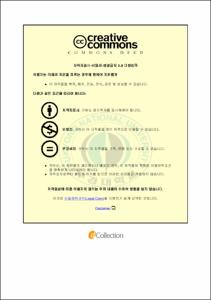영어 동요가 영어 학습부진아의 어휘력과 정의적 영역에 미치는 영향
- Abstract
- Effects of Children's Nursery Rhyme
on Vocabulary Ability and Affective Domains of Underachivers
at a Korean Elementary School
Kim, Hye Ran
Graduate School of Education
Pukyong National University
Abstract
Since the Seventh Curriculum Revision has been carried out, English education has focused more attention on underachievers' education. Even though there have been many attempts, it is still difficult to educate underachievers. In Korea's education system, teaching underachiever along with advanced students all in one class can be quite challenging. In addition, lower level students require different learning materials and motivation to learn. There have been many reports about how to teach underachievers effectively. However, developing materials which are not only effective but also interesting to students has been considered difficult.
The purpose of this study is to learn the characteristics of underachievers and know how effective teaching English vocabulary through nursery rhyme is to underachievers. In this study, fifth grade students who scored below 60 points out of 100 on their final term exam were considered underachievers.
To conduct this study, the following questions were asked:
First, what is an effective way to improve English vocabulary ability in 5th grade underachievers?
Second, what effect does using children’s nursery rhymes have on English vocabulary in 5th grade underachievers?
Third, what effect does using children’s nursery rhymes have on affective domains (interest, confidence, participation) to 5th grade underachievers?
The subjects of this study were five fifth grade students with English vocabulary ability problems at elementary school A, located in Yangsan city, Kyeongsang nam-do. An English ability test, questionnaires measuring students' interest in English and a survey on the students' background were implemented. It was carried out for ten days (three hours a day) in August, 2013. Due to their varying abilities, the five students were classified and taught separately in three groups: One upper level student, another one middle level student and three lower level students. The children’s nursery rhymes were selected considering the students’ linguistic levels and their interest; the lessons using selected children’s rhymes were given according to a well-designed instruction model and lesson plan. And then, teaching-learning activities using children’s rhymes were designed. To examine the effects of activities using children’s rhymes, a preliminary test and a post test were carried. Using the comparison between the preliminary test and the post test, the effect of activities using children’s rhymes were verified. This process in teaching was carefully and steadily recorded in a teaching journal. Included with in it, were teaching lessons, the results of everyday assessment and the students' reactions.
The result of teaching children's nursery rhymes to the students in this manner showed:
First, teaching children’s rhymes is an effective way to improve English vocabulary ability in 5th grade underachievers. Second, the students' English ability has significantly improved especially in the field of vocabulary. Third, introducing various activities using children's rhymes helped the students enhance their participation and thus impacting their interest and confidence in English in a positive manner. From the analysis above, the teacher recognized that the intensive program during vacation was very effective in the improvement of under achieving students English ability.
Based on the results of this study, a more efficient alternative can be proposed as follows:
First, it would be better to instruct the underachievers separately two or three times a week during the semester and not just during vacation. In addition, more attention needs to be given to the lower level students, which will improve their performance. This way, the gap between lower level and advanced students can be reduced.
Second, this study shows nursery rhyme is an effective learning tool for underachievers. Therefore, we need more focus on ways to teach underachievers by using nursery rhyme in English education such as writing and speaking.
Third, making the parents of underachieving children aware of their children English level is key. This way, they may be more willing for their child to do extracurricular activities such as joining an English camp to improve their language skills.
- Issued Date
- 2014
- Awarded Date
- 2014. 8
- Type
- Dissertation
- Publisher
- 부경대학교
- Affiliation
- 교육대학원
- Department
- 교육대학원 영어교육전공
- Advisor
- 박매란 교수님
- Table Of Contents
- 목 차
영문 초록
Ⅰ. 서론 ‧‧‧‧‧‧‧‧‧‧1
1.1 연구의 필요성과 목적 ‧‧‧‧‧‧‧‧1
1.2 연구 문제‧‧‧‧‧‧‧‧‧‧2
1.3 연구의 제한점 ‧‧‧‧‧‧‧‧‧‧2
Ⅱ. 이론적 배경 ‧‧‧‧‧‧‧‧4
2.1 영어 학습 부진아 ‧‧‧‧‧‧‧‧‧‧‧‧4
2.1.1 영어 학습 부진아 원인 및 특성 ‧‧‧‧‧‧‧2
2.2 영어 동요를 통한 어휘력 증진‧‧‧‧‧‧‧‧5
2.2.1 영어 동요의 교육적 가치‧‧‧‧‧‧‧‧‧‧5
2.2.2 어휘의 중요성‧‧‧‧‧‧‧‧‧‧‧6
2.2.3 영어 동요를 통한 어휘 지도‧‧‧‧‧‧‧‧‧7
2.3 선행 연구 ‧‧‧‧‧‧‧‧‧‧‧8
Ⅲ. 연구 방법 ‧‧‧‧‧‧‧‧‧‧‧11
3.1 연구 대상 ‧‧‧‧‧‧‧‧‧‧‧‧11
3.1.1 연구 대상의 선정 ‧‧‧‧‧‧‧‧‧‧‧‧‧‧‧11
3.1.2 연구 대상 학생의 특성 ‧‧‧‧‧‧‧‧‧‧‧‧‧11
3.2 연구 기간 및 절차 ‧‧‧‧‧‧‧‧‧‧‧‧‧‧13
3.3 연구 도구 ‧‧‧‧‧‧‧‧15
3.3.1 영어 능력 평가 도구 ‧‧‧‧‧‧‧‧‧15
3.3.2 설문지 ‧‧‧‧‧‧‧‧‧‧16
3.3.3 수업일지 ‧‧‧‧‧‧‧‧17
3.4 분석 도구 ‧‧‧‧‧‧‧18
Ⅳ. 수업의 실제 및 부진아 지도 결과 ‧‧‧‧‧‧19
4.1 수업의 실제 ‧‧‧‧‧‧19
4.2 부진아 지도 결과 ‧‧‧‧‧‧‧‧‧43
4.2.1 부진아 영어 능력 평가 분석 ‧‧‧43
4.2.2 부진아들의 공통점과 차이점 ‧‧‧‧‧‧45
4.2.3 향후 연구 과제 ‧‧‧‧‧‧‧‧‧‧45
Ⅴ. 결론 및 제언 ‧‧‧‧47
5.1 결론 ‧‧‧‧‧‧‧‧47
5.2 제언 ‧‧‧48
참고 문헌
부록‧‧53
- Degree
- Master
- Files in This Item:
-
-
Download
 영어 동요가 영어 학습부진아의 어휘력과 정의적 영역에 미치는 영향.pdf
기타 데이터 / 4.33 MB / Adobe PDF
영어 동요가 영어 학습부진아의 어휘력과 정의적 영역에 미치는 영향.pdf
기타 데이터 / 4.33 MB / Adobe PDF
-
Items in Repository are protected by copyright, with all rights reserved, unless otherwise indicated.